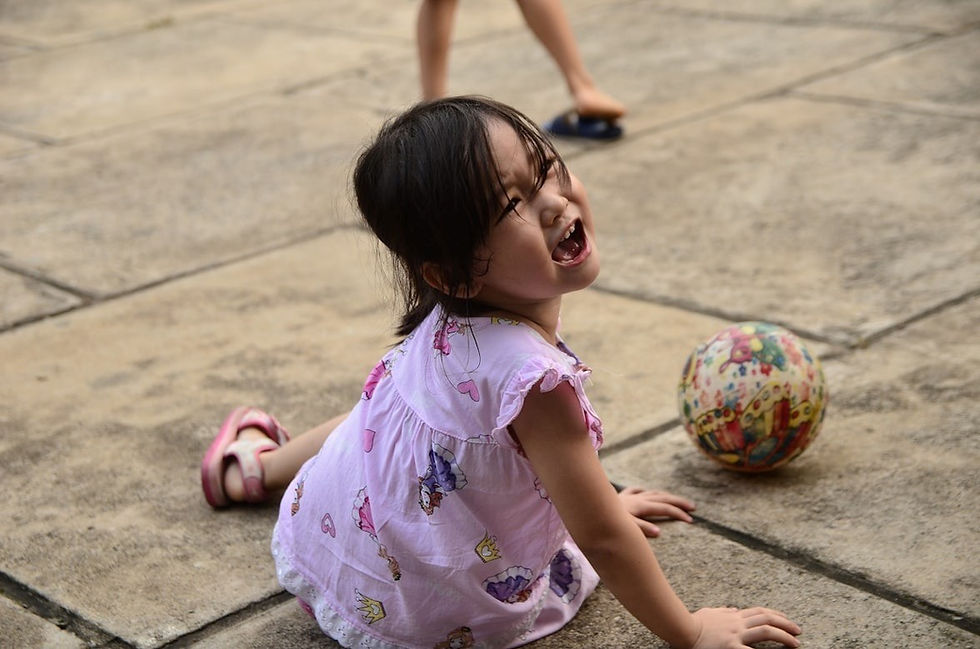How To Help Children Cope With Loss
- Carissa Menard, CCLS

- Nov 18, 2024
- 4 min read

Grief is complex for people of all ages, but it can be especially challenging for children. Unlike adults, children have less experience and understanding of death and the emotions that come with it. Whether they have lost a loved one or a pet, they need support and guidance, and adults bear the significant responsibility of providing both. Read on to learn how to help a child cope with loss.
The Different Ways Children Grieve
The first thing you should know about a child coping with loss is that their grief can present differently. Ultimately, children do not grieve as adults do, and how they do depends on their age, emotional maturity, and cognitive understanding of death.
Infants and Toddlers (0-2 Years Old): At these developmental stages, the children do not know what death is but can feel a sense of loss and separation. They might respond to the change by looking for the deceased or becoming irritable and crying more than usual.
Preschoolers (3 to 4 Years Old): When they reach these ages, children may see death as reversible or temporary and ask questions repeatedly as they try to grasp the permanence of loss.
School-Age Children (5 to 12 Years Old): School-aged children begin to understand that death is permanent, which makes them more fearful and anxious about losing others. They may express grief through anger, sadness, or even behavioral changes.
Adolescents (13 Years Old and Above): Teenagers usually comprehend death more like adults do, though they may mask their emotions or seek privacy. Teens know that death is a part of life, and some may try to escape the discomfort and pain of losing someone by engaging in risk-taking behaviors.
Explaining Death to Children
To help children cope with loss, adults must learn age-appropriate explanations about death to aid them in making sense of what has happened. Talk about death does not cause more fear or anxiety. The child is already likely experiencing those emotions. Explaining death to children allows for them to appropriately respond to the reality of what they are going through. Here are three ways to approach the conversation:
Use Simple, Honest Language: Avoid euphemisms like “passed away” or “gone to sleep,” as these can be confusing to children. Instead, use clear language, like “died” or “death” to help them understand without misconceptions.
Avoid “Easy” Explanations: Explaining death as something it is not, such as “God needed another angel” or “They are in a better place,” may provide temporary comfort but can also create unrealistic expectations. Abstract explanations like this are especially confusing to younger children.
Invite Questions: Children are naturally curious and may ask many questions. Respond to each with patience, giving simple answers based on their age. Never shame or dismiss a question. If you do not feel comfortable answering or do not know the answer, it is okay to say “I don’t know” or “I am so glad you asked me this, but I am not sure how I want to explain it right now.”
Supporting Your Child’s Grieving Process
It’s crucial to meet kids where they are in their grieving process. Here are more ways to help a child cope with loss:
Encourage Expression of Emotions: Let children express their emotions freely without judgment. In fact, it’s okay to show them you’re also grieving. Give every emotion a name, whether sad, angry, or confused, and reassure children that it is normal to feel them.
Maintain Routine and Stability: Try to keep daily routines as consistent as possible. Generally, stability provides a sense of security for children, making them feel that their world is still predictable despite the chaos. Invite family and friends to help maintain your child’s routine like bringing them to soccer practice or making sure they have lunches packed for the week.
Create Memorial Rituals: You can plant a tree, light a candle, create a photo album, or do anything significant of the child’s choosing. These activities can connect them to the person that died and offer a way to express their grief constructively.
Be Present and Listen: Spend time with your child where they have your undivided attention, and listen when they choose to talk. Children often open up when they feel and know they have someone to hear them without interruption or distraction.
Seek Professional Support: When grief feels overwhelming, professional support can be invaluable for both the child and family. Therapists can offer specialized tools to aid children in processing their emotions healthily, communication strategies, and an environment to heal together.
Help Kids Cope, Grieve, and Heal With Hearts Connected
Learning how to help children cope with loss takes time, patience, and even professional services. You can guide them toward healing by recognizing the unique ways children experience grief, providing clear explanations, and offering ongoing support. While grieving may never be easy, you never have to face it alone.
At Hearts Connected, our team of mental health providers specialize in children’s grief and focus on the needs of children, teens, and families facing challenging transitions. Call us at (404) 516-0906, or schedule a session for your child or yourself here. Our team is ready to connect with you and provide support.








Comments